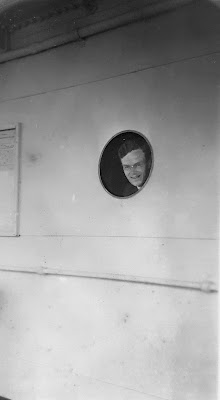Lat: 5° 2’ N. Long: 3°
32’ W. 276 Miles travelled.
We reached Grand Bassam this morning. Far away from the coast earlier in the day we passed a little tiny canoe with one occupant – an African. The canoe must have been about 10 feet long and yet I am told they go up to 10 miles from land into the Atlantic. They are said to be the smallest ocean going craft in the world. Certainly it looked almost like a cork as we passed it!
Three boats paddled by Africans came out to us as we
anchored in deep water some distance from the shore. Each man had a paddle
looking like a large arrow with a very broad head. The appearance of the boat
as it approached (the Paddlers arms and paddles all seemed one) was that of a
huge spider crawling on the water!
 The passengers who came on board and those who left were
transported to and from the little boats in a wooden pannier using the ships
tackle (crane) just as luggage and mail bags are hoisted!
The passengers who came on board and those who left were
transported to and from the little boats in a wooden pannier using the ships
tackle (crane) just as luggage and mail bags are hoisted!
There were two English boats lying off Grand Bassam. I think
every group of ships we have seen so far has included one or more British ships
in its number. It gives one a peculiar pleasure to see a distant ship flying
the English flag – and fortunately these ships are plentiful in all the waters
of the world.
with a gross tonnage of 22,058,112 tons.
the ships of the rest of the world only total 22,372
with a gross tonnage of
43,108,126 tons. So that one
in every three ships met on the Ocean is British.”
“There are always about 1,000 ships
Of the British register traversing the
trade routes at any given moment and
these trade routes have a length of
80,000 square miles”
- Excerpts from two news
We are now sailing in the equatorial waters known as the
Doldrums. This region was much dreaded by sailors in the old days before steam
ships were known because sailing ships were sometimes becalmed for days or
weeks in a perfectly helpless condition.
This is a dull day, with grey sea and leaden sky almost the
same colour. There are no waves and the surface of the sea is quite smooth
except for the undulations of the Atlantic rollers which heave up and down. One
can quite imagine what dread these waters running along the equator had for the
ancient mariners. With our steam driven propeller we cannot understand what
travelling meant to them in those days. Far out at sea in this belt of water
the wind has practically no direction (except upwards!). As we are really
fairly near land (though we cannot see it) we enjoy the cool air produced by
the land and sea breezes previously mentioned (July 29) while the coal fires
send us further onwards.
Indeed we are steadily steaming off the map! At the point
where we cross the equator (i.e. 0.0° of latitude) we shall be almost exactly
on the Greenwich meridian of longitude 0.0° .
 |
| The view from "nowhere" |
Thus our “address” will be 0° Lat, 0° Long. The depth of
water in this region is 20,000 feet (3000 fathoms). In other words we shall be
nowhere! This is the only spot on the Earth of which this can be said, so we
are really very privileged in visiting this on our first ocean trip.
“Now a sounding of 3000 fathoms requires seventy-five
minutes for its accomplishment, and the approximate
time of descent will be thirty minutes. The Imagination
grasps more readily the tremendous significance of such
a depth as the wire runs out steadily and rapidly, minute
after minute, for half-an-hour; while the seventy pound lead
plunges downwards from the lambent blues and greens
of the surface waters to the black depths below; while it
passes through a magic world
‘…where the branching coral hives
Unending strife of endless lives;
Where, leagued about the ‘wildered boat,
The rainbow jellies fill and float;
And, lilting where the laver lingers,
The starfish trips on all her fingers’
Thus, the spirit of true romance inspires even such a prosaic
proceeding as sounding the oceanic depths, where strange
creatures flit through the black darkness by the light of their
own phosphorescence; where reigns a stillness like that of the
farthest depths of space, untroubled by the thundering
tempest overhead; where even the dominion of man is still
in evidence, in the stretch of the submarine cable which links
two continents together, hung in catenary curves across the
hollows, or lying half-buried in the ooze of the oceans bed.”
- Excerpt from news clipping.
So far it has been nothing like so hot as I expected. At present
it is considerably cooler than much of our home summer weather. There is,
however, a moistness in the air that makes one feel perpetually more or less “sticky”
– apart from this we have had practically nothing that could be called “trying”.
The clocks are forward another half an hour today.
On a long journey as ours is – 6 weeks or more – we come up
against the question:
Why?
Why bother?
Why come?
Why care at all?
The last 3 pages of the Jungle Book (Kipling) suggest a key
to the answer (ch. On Her Majesties Servants). It is a Kings Command that Christianity
to a man “carries on” with the work, ones not to reason why. It is also a
desire – a longing – of a heavenly father that this thing should be done and it
would be mean not to.
It is also the word of a Gentleman of the strictest honour:
We must go on.



























